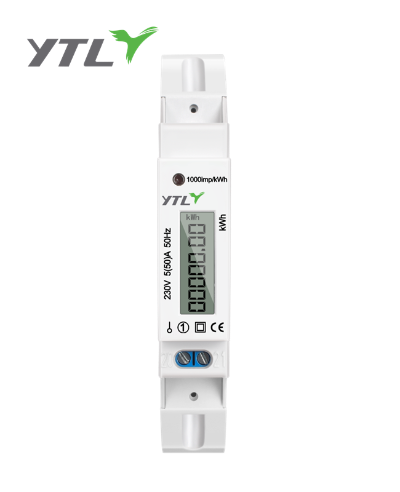What is a kWh meter? A kWh meter, also known as an electricity meter, is an instrument used to measure the amount of electrical energy consumed by residential, commercial, and industrial customers. It is a critical component of the electricity supply system as it enables the electricity supplier to bill customers based on the amount of energy consumed during a billing period. A typical kWh meter is a small, box-shaped device that is usually installed outside, on the side of a building.
A kWh meter, also known as an electricity meter, is an instrument used to measure the amount of electrical energy consumed by residential, commercial, and industrial customers. It is a critical component of the electricity supply system as it enables the electricity supplier to bill customers based on the amount of energy consumed during a billing period. A typical kWh meter is a small, box-shaped device that is usually installed outside, on the side of a building.
The kWh meter measures electricity consumption in kilowatt-hours (kWh). A kilowatt-hour is a unit of measurement that represents the amount of energy used by a 1,000-watt appliance for one hour. For instance, if you run a 100-watt light bulb for 10 hours, you will have consumed 1 kWh of electricity. When you switch on an electrical device, the current flows through the meter, and the meter records the consumption of energy in real-time. The meter's display is updated regularly to show the total amount of energy used since the last reading.
The role of the kWh meter is to provide an accurate measurement of the energy consumed by customers. This is important for several reasons. above all it allows electricity suppliers to bill customers accurately, ensuring that they pay for the energy they use. Secondly, it helps to incentivize customers to use energy efficiently, as they can see the impact of their usage on their bills. Finally, it also enables electricity suppliers to manage the electricity supply network effectively by ensuring that they have a reliable estimate of overall demand.
Today, kWh meters are digital, which means that they use electronic components to measure and record energy consumption. They typically have a display screen that shows the amount of energy used, as well as other features such as time-of-use information. This can be used to provide customers with more detailed information about their usage patterns. In addition, some meters also have remote communication capabilities that allow them to transmit usage data wirelessly for remote monitoring and billing purposes.
However, not all kWh meters are created equally. In some cases, meters can become inaccurate over time, causing customers to be billed either too much or too little for their energy usage. This issue can arise due to a variety of factors, including meterage, exposure to weather conditions, and tampering. To address this issue, it is crucial for meters to undergo regular maintenance and calibration to ensure their accuracy and reliability.
In summary, the kWh meter is a critical component of the electricity supply system, providing accurate and reliable measurement of energy consumption for billing and network management purposes. With the increasing demand for energy efficiency and sustainability, the role of the meter is likely to become even more important, enabling customers and energy suppliers to work together to manage and reduce overall energy consumption.
What Is A kWh Meter?

YTL is a professional supplier of energy meter and AMI solution. the Top 100-enterprise with most investment value in Zhejiang. And“Yongtailong”is the famous brand of Zhejiang. With nearly 20 years' experience in energy metering, we devote ourselves to providing competitive projects and creating value for customers.
● Online + Offline. Provide cost-effectiv solutions
● Strict quality control mechanism.High quality assurance
● Five R&D centers,combine with hardware&software design, experiment and testing
● Global service capability, provide customers timely and effective solution
● Good customer feedback. Reliable after-sales service
● Online + Offline. Provide cost-effectiv solutions
● Strict quality control mechanism.High quality assurance
● Five R&D centers,combine with hardware&software design, experiment and testing
● Global service capability, provide customers timely and effective solution
● Good customer feedback. Reliable after-sales service

 English
English 简体中文
简体中文

.png?imageView2/2/w/500/h/500/format/png/q/100)




.png?imageView2/2/w/500/h/500/format/png/q/100)






